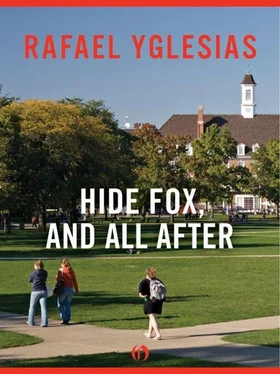He saw more of Jeff because of this, though his other fair-weather friends avoided prolonged contact. Raul preferred it that way. He found solitude comforting: he emerged stronger and wiser. Within, desperately, he felt the need for strength — an invulnerability to the insults, minute and monstrous, his station in life seemed to invite.
A few days after the happening in Henderson’s office Raul, getting into a subway car to go home, met his mother. He exclaimed and sat down next to her. He was pleased to see her. “What are you doing here?” he asked.
His mother briefly considered lying but felt that Raul deserved more than that. “I went to see the school psychiatrist.” Raul’s anger was transparent. “He asked to see me,” she went on.
“Oh?” His mother, a miraculous calm on her face, nodded. Raul, annoyed at her not elaborating, burst out, “What happened?”
“Nothing,” she said, a little annoyed at his tone. “I didn’t know what to say. I told him I was upset and confused and that I didn’t understand why you were cutting.”
“And? What did he say?”
“Nothing. He said I shouldn’t worry.”
Raul turned away in anger. “Why did you go?”
“I wanted to.”
“What do you mean, you wanted to!”
His belligerence was presumptuous and angering.
“You know, I didn’t have to tell you I went. I have my reasons and I’ll keep them to myself,” she said.
“I would thank you, when you play with my life, to consult me first.”
She laughed. “I’m responsible for you. It’s our money you’re wasting.”
Too old an argument to pursue. Raul closed his eyes in shame and anger. “Did they ask Dad?”
“They asked both of us.”
“And did he go?” he asked, about to scream.
“No. Your father said he didn’t think it was necessary.”
Raul calmed. It came out of pride, he thought, but at least his politics are correct. “Are you going to go every week?” Raul asked with evident sarcasm.
She looked at him and frowned. “He just wanted to see me.”
That night Raul trembled with rage. His mother going didn’t matter so much. It was the school and its cheap tactics. Its cheap rationalizations. The society’s cheap process: get all the anti-nine-to-fivers, the capable students who won’t go to school, bend them, dull the pearl that flaws their normality. They wouldn’t give an inch of their curriculum, of their blundering faculty. And that they dared try this filthy cheap trick on him. It was an insult to his perception. Now they not only denied his identity, they were trying to recast it.
But how could he strike back? It seemed that they wanted him: if they were willing to tame him, they wanted him. He had to destroy that hope irrevocably; lead them on, and smash it. Appear wildly defiant, beautifully opposed.
The last week of regularly scheduled school, Raul saw Mr. Miller each day, talking eagerly of next year’s productions, outlining his intense studying for final exams. He would linger after class with his English teacher, Mr. Bowden, doing the same. He imitated the humble tones of other “rebels” reforming, harboring jealously the knowledge of its falsity. He went into the same detail with his parents, acting it out, reading Dreiser on the sly.
After closing exercises, four days were given to exams. These days carried a sort of emotional ambiguity: the brief days, only two hours of tests per day, had an air of college freedom, but the tests’ intensity seemed to concentrate school pressure into one overpowering dose. On Friday, after the farewell speech, the students hurried about with the frightening joy of experimental rats whose maze has been widened. Raul, whimsical amidst this activity, met Alec, whom he hadn’t seen for three weeks, in front of the theater.
“Ah,” Raul said, seeing him, “so you’ve come to bid adieu to the ol’ theater.”
“I, yes. But why you asked to come with me, I don’t know.”
“I won’t see it for a long time.”
“Just the summer.”
“True,” Raul smiled.
Alec mistrusted that smile. They went up the stairs in silence. The auditorium was deserted. Alec stopped him while they were walking down an aisle. “You are going to stay?”
“Of course,” Raul said, laughing. “I’ve been studying my ass off for the finals.”
Alec smiled affectionately. He patted Raul on the shoulder. “Good,” he said.
They went up to Miller’s office. His stage manager and technical director were going over the last details of locking everything up. He nodded at Raul and Alec, who sat down quietly. When they were alone with Miller, Alec said, “Shutting up shop, eh?”
Miller nodded, dragging on his cigarette holder.
Raul watched that object of pretension tap against an ashtray. “You won’t be here during finals?” he asked.
“No, I’ll be working on my stone wall,” he said, smiling intimately.
“Nor during summer school?”
“No.” They all laughed. “Thank God.” They laughed less forcefully. “No, actually, I’m not needed. They only use the auditorium, see, and White knows how to handle that.”
“I won’t see you”—Raul cleared his throat—“until fall then.”
“Probably. Come up to my house any time you’d like. It would be a pleasure to have you come.”
“Thank you, I will.”
Alec beamed at Raul, who returned a frown. “Alec,” Miller said, “you’ll come back and see Othello, won’t you?”
“Certainly.”
“Good.” He rose. “I have to go down and check on a few things.”
Alec and Raul, in turn, wished Miller a pleasant summer. After he left, they sat silently.
“Cigarette?” Alec asked, coming out of reverie.
“No. Let’s say good-by to the theater and go.”
They went down to the stage, each going to a separate wing. They walked toward each other, meeting mid-stage and shaking hands. Despite the sentimentality, or because of it, they were moved by the moment. It caught briefly, powerfully, the range of that life.
Raul had to take four finals; for the first three, he went. He took them with abandon, feigning nervousness. How he loved the calm that preceded the storm he would create. The last day would be the math final. A pity, he wrote in his diary, for it would intrigue me. He arranged with Jeff to go to his house for the night after the test. He asked his parents for permission, and they agreed. Westchester, Raul thought, that’s far enough.
He dressed, familiarly, in black and went to Mike & Gino’s. The group couldn’t believe he was serious, but when he didn’t leave with them, they were sure. Bill, before leaving, said, “That’s it, then.”
Raul nodded.
“I’ll see ya,” Bill said, a hand uplifted.
Raul returned the gesture. When left alone, Raul said out loud, “An odd generation that says good-by forever, as casually as a good night.”
Jeff, Raul having revealed his plan, hurried down the hill after finishing the test. But they had to wait for Jeff’s ride home. Eating lunch, listening to the old songs on the jukebox, Raul was intensely happy, bordering on hysteria.
They reached Jeff’s house, and when they had been there barely an hour, Raul’s parents called. Rafael Sabas, his red face vividly outlined in Raul’s mind, yelled, “You’re not going to that school any more. I don’t care how much you plead with us, you’re not going to waste our money like a spoiled brat. And I want you to come home immediately. Get the next train…”
Raul, who had been remarkably calm up to this point, rumbled with anger, “Wait a minute. I don’t care if I don’t go there. I want it that way. But I’ll come home tomorrow…”
“Raul”—his father’s voice mounted in anger—“you’ll come home right this minute. Do you understand me? I’m your father, you’ll do what I say. Come home immediately.”
Читать дальше











